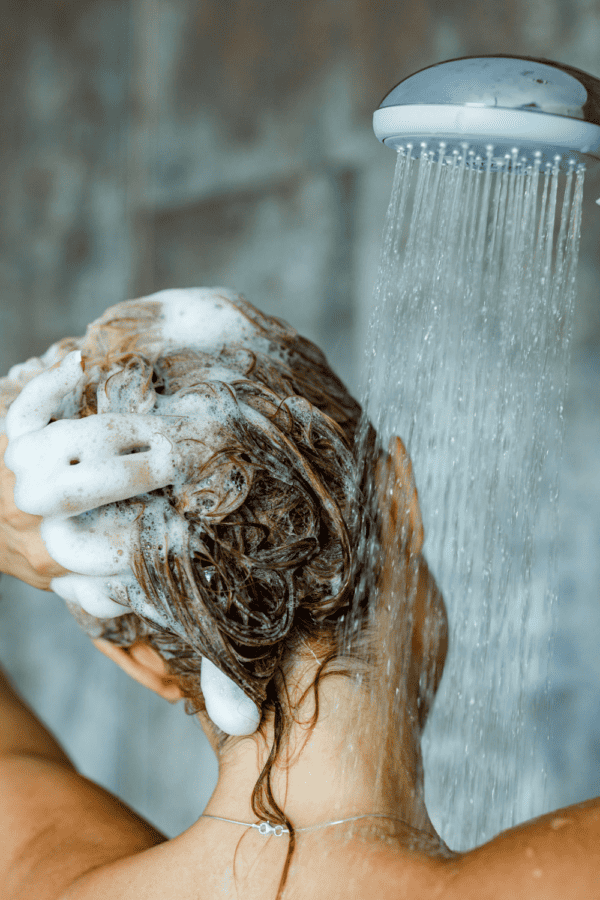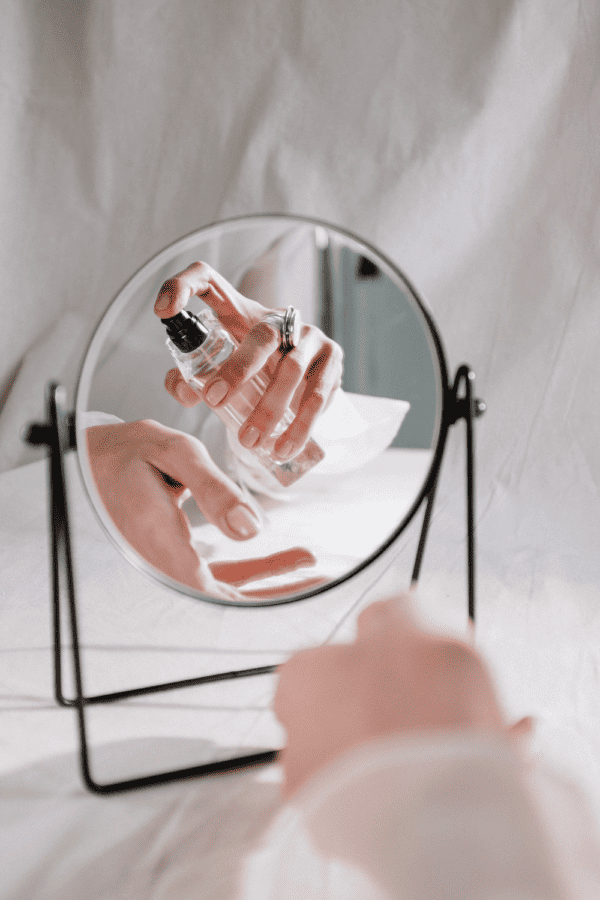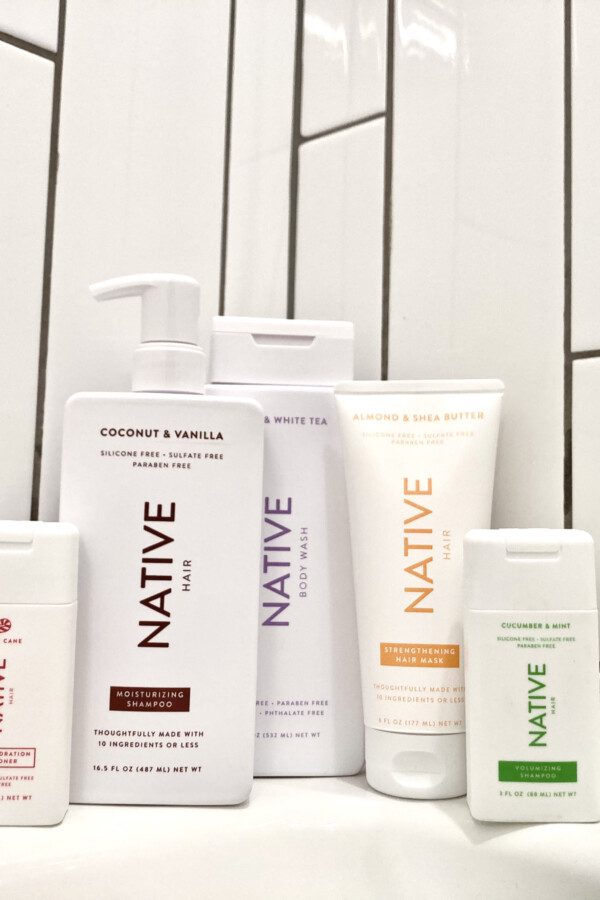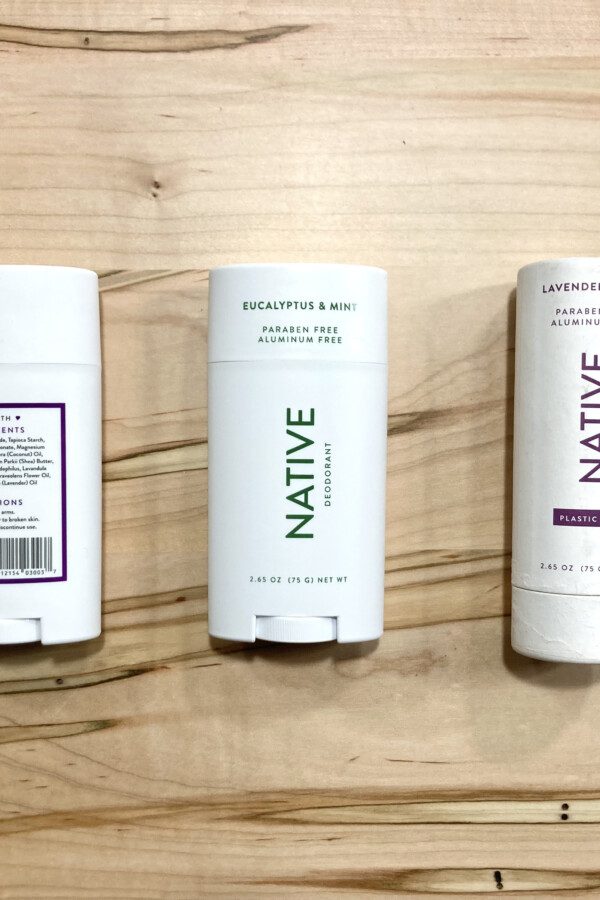P&G has been making headlines this past week (December 2021 if you’re reading this in the future) by voluntarily recalling 32 of its dry shampoo products because they were found to contain “unexpected levels” of benzene, a known carcinogen. P&G brands affected included Aussie, Hair Food, Herbal Essences, Old Spice, Pantene, and Waterl<ss.
[UPDATE] In October 2022, Unilever issued their own recall for several of their dry shampoo products for the same reason (elevated levels of benzene). This recall includes dry shampoo from Dove, Nexxus, Suave, Rockaholic, Bed Head, and TRESemmé.
This has many readers asking us: what about Batiste?! Is this popular dry shampoo brand a part of the recall? Does Batiste contain benzene? Is it safe to use?
[ANOTHER UPDATE!] On October 31, 2022, an independent lab testing company called Valisure released a report, petition, and call for FDA action regarding benzene found in 70% of the dry shampoo they tested. These tests actually included several varieties of Batiste, so we now know that Batiste does in fact contain benzene. More info on this below.
Table of Contents
- What’s the Problem with Benzene?
- Is Batiste Dry Shampoo Recalled?
- Does Batiste Contain Benzene?
- Batiste Ingredient Investigation
- Are These Ingredients Bad for You?
- Does Batiste Dry Shampoo Contain Talc?
- Does Batiste Dry Shampoo Contain Sulfates or Parabens?
- Is Batiste Dry Shampoo Phthalate-Free?
- Does Batiste Dry Shampoo Have Aluminum?
- Is Batiste Dry Shampoo Gluten-Free?
- Is Batiste Vegan and/or Cruelty-Free?
- Who Owns Batiste?
- What to Use Instead of Batiste
- Conclusion: Is Batiste Dry Shampoo Safe to Use?
What’s the Problem with Benzene?
Benzene is a known carcinogen, most specifically linked to leukemia. P&G sums it up pretty well in their statement:
“Benzene is classified as a human carcinogen. Exposure to benzene can occur by inhalation, orally, and through the skin and it can result in cancers including leukemia and blood cancer of the bone marrow and blood disorders which can be life-threatening. Based on exposure modeling and the cancer risk assessments published by the Environmental Protection Agency (EPA) (IRIS database), daily exposure to benzene in the recalled products at the levels detected in our testing would not be expected to cause adverse health consequences.”
Is Batiste Dry Shampoo Recalled?
No, Batiste was not part of the December 2021 P&G recall, nor the October 2022 Unilever recall. Batiste is not owned by P&G or Unilever (it’s owned by Church & Dwight Co., Inc.) and therefore was not tested for benzene for these recalls.
However, now that we have the test results from the Valisure independent lab testing, we now know that Batiste does indeed contain benzene. At this time, Batiste still has not been recalled, even though the Valisure petition is calling on the FDA to do a mandatory recall.
(There are also some other concerning ingredients in Batiste, separate from the benzene issue, which we’ll get to in a minute.)
Does Batiste Contain Benzene?
Yes. Valisure tested many different kinds of Batiste dry shampoo (including ones like “Bare,” “Floral & Flirty Blush,” “Divine Dark,” and others). Benzene was found in almost all of them, all the way up to 14.9 part per million (ppm). (The FDA currently has benzene limits set at 2ppm.)
Valisure tested many other brands as well, including Not Your Mother’s, Garnier Fructis, Redken, and more. In all, they tested 148 unique batches from 34 different brands and found benzene in about 70% of the dry shampoo they tested. You can view the full results of the tests here.
It’s important to keep in mind that benzene has not been added to these products intentionally; rather, it is a contaminant. This is why it’s practically impossible to tell whether or not a certain product contains benzene without someone actually testing it. In general, though, there is increasing concern about aerosol products of all kinds containing benzene—not just dry shampoo but also other things like spray sunscreen and deodorant.
Batiste Ingredient Investigation
Benzene aside, what about the other ingredients—are they safe?
Well, here are the ingredients listed in Batiste’s “Original Classic Clean” dry shampoo: Butane, Isobutane, Propane, Oryza sativa starch, Alcohol denat., Parfum (Fragrance), Limonene, Linalool, Geraniol, Benzyl benzoate, Distearyldimonium chloride, Cetrimonium chloride.
Are These Ingredients Bad for You?
Let’s take a look at these ingredients one by one and assess them for safety:
Butane: Commonly used in aerosol sprays, this is a volatile organic compound (VOC) and known irritant, meaning it can cause and/or exacerbate respiratory problems and asthma. It is on MADE SAFE’s Banned List and gets a score of 6 on EWG’s Skin Deep database.
Isobutane: Also used in aerosol sprays, this is very similar to butane; it’s just is a bit different structurally and is odorless. It is also on MADE SAFE’s Banned List and gets a score of 6 on EWG’s Skin Deep database.
Propane: Propane is the last of the ingredients used as a propellant for aerosol sprays. It’s not as bad as the previous two ingredients, but it’s not great either, as it is also a known irritant. Propane is NOT on MADE SAFE’s banned list (although many similar ingredients are). It gets a score of 3 in EWG’s database, which is considered the low end of moderate.
Oryza sativa starch: This is just rice starch and is safe. The only thing you really have to worry about is pesticide contamination, but that’s the case with any non-organic ingredients.
Alcohol denatured: When used in the right quantities, this is a safe ingredient. Some people might find that alcohols are a little harsh on their skin, though. If this is the case for you, you may want to consider choosing a non-toxic, alcohol-free dry shampoo brand.
Parfum (Fragrance): Whenever you see this ubiquitous ingredient listed in your personal care or cleaning products, it should always raise a red flag. Because of a loophole in the law, companies are legally allowed to hide almost 4,000 different ingredients under the word “fragrance” or “parfum” without actually disclosing those ingredients to consumers.
Some of these ingredients are completely safe (lavender, for example, is on the list), while others (like phthalates) are known toxins. Consumers deserve to know what’s in the products they buy, and for this reason, we almost never recommend products with “fragrance” listed on the ingredients (with the exception being if the brand actually makes those fragrance ingredients publicly available and they are indeed safe). You can read more about this fragrance loophole problem here.
Limonene, Linalool, Geraniol: These are iffy ingredients. They’re found naturally in many plants (mostly citrus), but they can also be extracted and made synthetically. These ingredients are classified as irritants, allergens, and sensitizers, but their potential to cause damage depends a lot on:
- how they are sourced
- how concentrated they are
- the individual using the product (some people are much more sensitive to these ingredients than others)
These ingredients can be quite difficult to avoid, but if you’re someone who has extra sensitive skin, you should consider trying to remove them from your regimen to see if it makes a difference for your skin.
The EWG scores for these ingredients range from 3 to 5. On MADE SAFE’s Banned List, they are listed as banned “when not a naturally-occurring component of whole plant oil.”
Benzyl benzoate: Often used as a fragrance ingredient and solvent, benzyl benzoate is a known irritant and allergen. This one is also on MADE SAFE’s Banned List and gets a score of 4-5 in EWG’s database.
Distearyldimonium chloride: This ingredient is a known irritant. According to the Association of Occupational and Environmental Clinics, it is an asthmatic sensitizer, which means it can actually cause (not just exacerbate) asthma.
Cetrimonium chloride: Similar to the previous ingredient this is also a known allergen and asthmatic sensitizer. This is yet another ingredient on MADE SAFE’s Banned List and gets a score of 4 in EWG’s database.
Body
8 Safe & Non-Toxic Dry Shampoo Brands (Benzene-Free!)
I’ve picked 8 of the best of the (benzene-free), non-toxic and safest dry shampoo brands available. Ditch the harsh chemicals to go clean & natural!
Does Batiste Dry Shampoo Contain Talc?
Nope! Luckily, this is not an ingredient you have to worry about either. (If you’re wondering: talc itself is not toxic, but it’s very often contaminated with asbestos, which is a known carcinogen.)
Does Batiste Dry Shampoo Contain Sulfates or Parabens?
No. You don’t have to worry about parabens or sulfates either.
Is Batiste Dry Shampoo Phthalate-Free?
Well, we don’t know. There are several different kinds of phthalates (as well as other endocrine disruptors) that are allowed as “fragrance” ingredients. Since Batiste does not disclose their fragrance ingredients or explicitly say they’re phthalate-free, we cannot confidently say they’re phthalate-free.
We’ve reached out to Batiste to ask about this issue, and we’ll update this article if and when they give us an answer!
Does Batiste Dry Shampoo Have Aluminum?
Nope! This is one ingredient you don’t have to worry about.
Is Batiste Dry Shampoo Gluten-Free?
No. As stated on the website: “Gluten is part of Batiste Dry Shampoo formulas and helps them work like magic. Gluten is not an ingredient in Waterless Cleansing Foam, but we cannot guarantee that our Foams do not contain gluten.”
Is Batiste Vegan and/or Cruelty-Free?
Not really. Here is the official statement on this issue from Batiste’s website:
“Church & Dwight Co., Inc. is fully committed to ensuring and protecting animal welfare. We use only materials already known to be safe. It is our policy not to test on animals, and we also request that suppliers not test any materials or products on animals, unless required by law or regulation.”
In other words: Batiste dry shampoo COULD be cruelty-free, but we can’t be sure that some of their ingredients are not tested on animals.
Who Owns Batiste?
Batiste is owned by Church & Dwight Co. Other brands you might know of owned by Church & Dwight Co. include Arm & Hammer, Oxi Clean, Orajel, Trojan, First Response, Nair, and Kaboom.
What to Use Instead of Batiste
Because of Batiste’s benzene contamination, lack of transparency about fragrance ingredients, and the MULTIPLE allergens and irritants used in their formulations, we cannot recommend using any of the brand’s products.
But don’t worry: we’ve done extensive research on a ton of dry shampoo brands and we’ve picked out the absolute safest ones. You can check out our guide to non-toxic dry shampoo and recommended brands right here.
Conclusion: Is Batiste Dry Shampoo Safe to Use?
We recommend skipping the Batiste and using one of these brands instead.






I have been using Batiste Dry Shampoo for years now. I didn’t see it on the list and I felt so relieved until now obviously. So now what? Now what do we do now sit and wait to see if we get sick or not?! Is there tests we can take? It’s terrible that we trust these companies to keep us safe…
Hi Brandee,
Yes, it is terrible. 🙁 I’m sorry you’re feeling anxious about this. There’s not really much you can do besides try to avoid these types of chemicals where you can, and then do the recommended cancer screenings (mammograms, pap tests, etc.) Carcinogens are all around us and we cannot avoid them entirely, but what’s why we recommend focusing on what you CAN control—like switching to aerosol-free dry shampoo!
Thank you for this information despite the difficult task of reporting without complete manufacturer/corporate disclosures of the products in question. I bought a can of Batiste in January for a 3-week road trip: I used it 2–3x while on the road, 3–4x since & still have more than half the can left. Although I have used it sparingly, I discarded this can after reading several reports and articles & will explore other dry “shampoo” including your list of safer, alternative products.
Could we talk about the safety if root cover up sprays made by ecerpro and L’Oréal?
Hi Meri,
I see that both of the products you suggested are aerosol sprays. The benzene issue is one of contamination in aerosol sprays, which means there’s no real way of knowing if a specific product contains benzene without having it lab tested. I have not seen anything about root cover-up products being tested yet, but considering that several different kinds of aerosol spray products have been found to be contaminated for the past few years, our suggestion is to avoid using aerosol sprays on a regular basis, if you can. I hope that helps!
“ We’ve got your answers to all of these questions.” Proceeds to say they don’t know…
Hey Riley! Not sure if you read the article thoroughly, but here is the summary of our answers to those questions:
Is this popular dry shampoo brand a part of the recall? – No, it’s not part of the December 2021 recall nor the October 2022 Unilever recall (in part because Batiste is not owned by either of those companies.)
Does Batiste contain benzene? – You’re right that we don’t know whether or not Batiste contains benzene and that’s the problem. As the article explains, these products are being recalled because they are contaminated with benzene, meaning it’s not added intentionally (and wouldn’t be listed on ingredient labels). Therefore, there’s no way anyone would know if any of these products contain benzene (and how much) without testing it.
Is it safe to use? – As the article states, we don’t recommend using Batiste as the safest dry shampoo. Since it’s an aerosol, it’s more likely to contain benzene, but even more than that, it contains fragrance and several other ingredients (listed above) that aren’t entirely safe.
Hope that helps! 🙂
Batiste “Volumizing” dry shampoo absolutely DOES have talc. It’s a newer formula I believe.
I’ve been using it for about a month, and just happened to look at the label and thought… “damnit!” That’s what led me to your site.. I was looking for a natural alternative… which I found & ordered… so thank you!!!